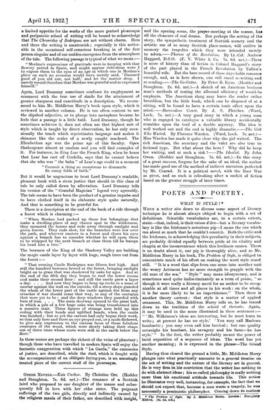OTHEB, NOVELS.—Kate Curlew. By Christine Orr. (Hodder and Stoughton. 7s.
6d. net.)—The romance of a Scottish laird who proposed to one daughter of the manse and subse- quently fell in love with. her elder sister. The poignant sufferings of the two girls, directly and indirectly caused by the religious mania of their father, are described with insight, and the opening scene, the prayer-meeting at the manse, has all the elements of real drama. But perhaps the setting of the story, the sympathetic treatment of Scottish scenery and the artistic use of so many Scottish place-names, will outlive in memory the tragedies which they were intended merely to adorn.—Therese of the Revolution. By Lt.-Col. Andrew Haggard, D.S.O. (F. V. White & Co. 7s. 6d. net.)—There is more of history than of fiction in Colonel Haggard's story of the part played in the French Revolution by Tallien's beautiful wife. But the bare record of those days holds romance enough, and, as is here shown, can still stand re-writing and re-reading.—The Go-Getter. By Peter B. Kyne. (Hodder and Stoughton. 2s. 6d. net.)—A sketch of an American business man's methods of testing the allround efficiency of would-be employie. The American slang may leave the reader rather breathless, but the little book, which can be disposed of at a sitting, will be found to have a certain tonic effect upon the mind.—Raeensdene Court. By J. S. Fletcher. (Ward, Lock. 7s. net.)—A very good story in which a young man who is engaged to catalogue a valuable library accidentally stumbles upon the trail of a double mystery. The idea is well worked out and the end is highly dramatic. The Girl Who Waited. By Florence Warden. (Ward, Lock. 7s. set.)— Miss Warden has made it quite clear why the girl waited. The rich American, the secretary and the valet are also true to fictional type. But what about the hero ? Why did he keep her waiting, and at such a risk 1—The Idealist. By John Owen. (Hodder and Stoughton. 7s. 6d. net.)—In this story of a great success, forgone for the sake of an ideal, the author has made good use of the method of indirect narration perfected by Mr. Conrad. It is a political novel, with the Boer War as pivot, and as such is refreshing after a surfeit of fiction based on the greater struggle of later times.


































 Previous page
Previous page